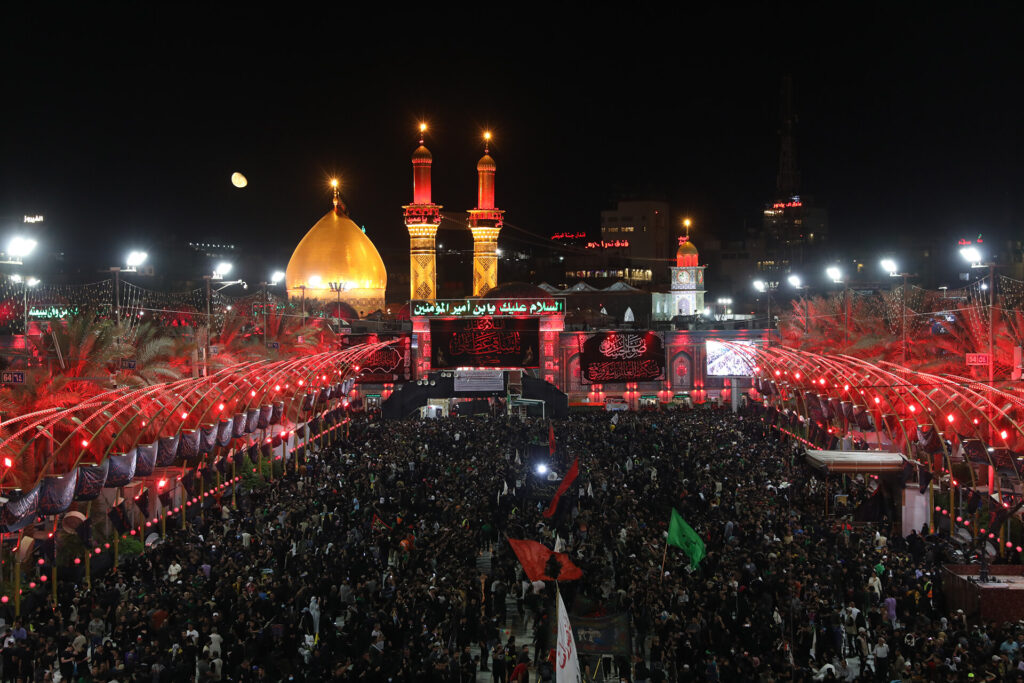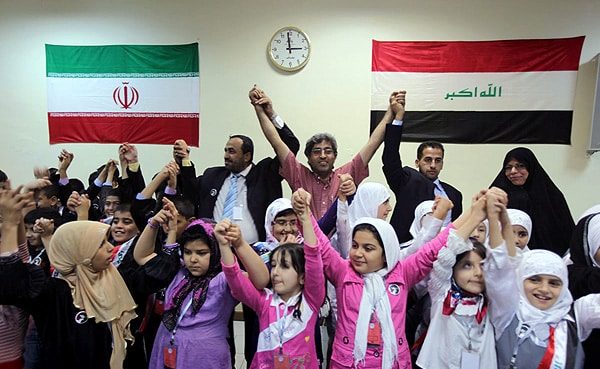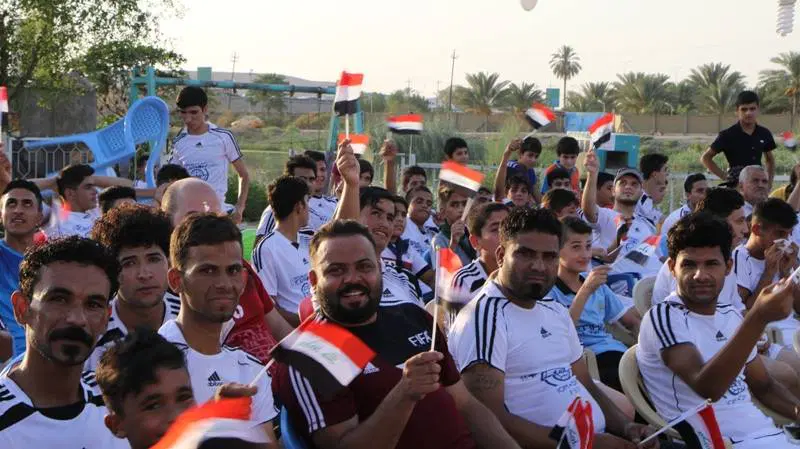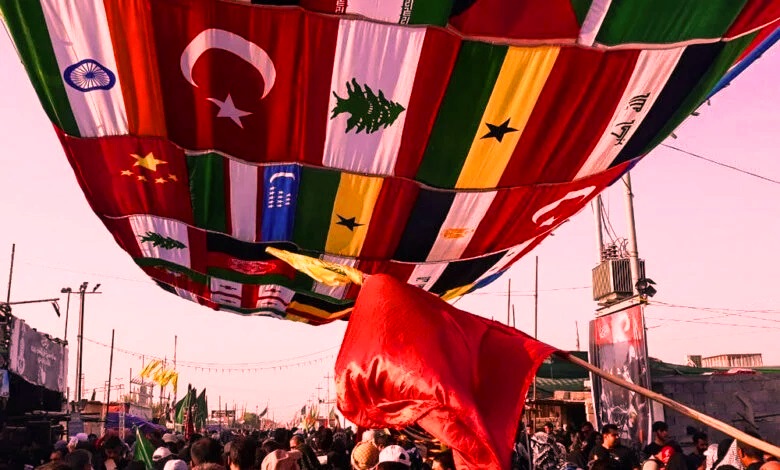The Karbala pilgrimage emerges as a vibrant scene where small, decentralized, and spontaneous communities flourish, catalyzing the development of a new cultural, economic, and diplomatic landscape. Within this dynamic environment, entrepreneurial endeavors and cultural initiatives thrive, breathing new life into local economies and fostering cross-border collaborations. As pilgrims gather to commemorate the legacy of Karbala, they inspire a spirit of unity and cooperation that transcends political boundaries and benefits not only Iraq but also neighboring countries such as Iran and Gaza. Through grassroots efforts and collective action, the Karbala pilgrimage becomes a catalyst for positive change, paving the way for a more prosperous, interconnected, and harmonious future across the region. In this article we delve in The Global Impact of Pilgrimage to Karbala and Najaf.

The Global Impact of Pilgrimage to Karbala and Najaf
The Global Impact of Pilgrimage to Karbala and Najaf extends far beyond religious observance, encompassing diverse realms such as socio-cultural, economic, and geopolitical spheres. At its core, the pilgrimage serves as a unifying force, drawing millions of people from across the globe to commemorate the martyrdom of Imam Hussein and his companions. This convergence of individuals from various backgrounds fosters interfaith dialogue, cultural exchange, and cross-border solidarity, transcending geographical and ideological boundaries. Economically, the pilgrimage stimulates local economies, driving infrastructure development and bolstering tourism sectors in Karbala and Najaf.
Furthermore, the pilgrimage holds geopolitical significance, as it showcases Iraq’s cultural heritage and religious significance on an international stage, influencing regional dynamics and shaping perceptions of the Middle East. In essence, the pilgrimage to Karbala and Najaf reverberates globally, leaving an indelible mark on individuals, communities, and nations alike, fostering unity, understanding, and interconnectedness across the world.
Cultural Significance of pilgrimage to Karbala and Najaf
The cultural impact of the pilgrimage to Karbala and Najaf extends globally, fostering understanding, tolerance, and celebration of diversity. By bringing together people from diverse cultural and religious backgrounds, the pilgrimage serves as a platform for interfaith dialogue and mutual respect. This interaction breaks down stereotypes and promotes acceptance, contributing to a more inclusive global culture. Additionally, the convergence of individuals with varied traditions enriches the cultural tapestry, highlighting the importance of preserving and embracing cultural diversity on a global scale.
Socio-political Impacts Pilgrimage to Karbala and Najaf
The pilgrimage to Karbala and Najaf holds significant socio-political implications on a global scale. Firstly, it serves as a symbol of resilience against oppression and injustice, resonating with communities worldwide who advocate for social justice and human rights. This pilgrimage also facilitates cross-cultural dialogue and understanding, fostering diplomatic ties and mitigating tensions among nations with diverse religious populations. Moreover, the massive influx of pilgrims stimulates economic growth in the region, encouraging infrastructure development and job creation, thus enhancing socio-economic stability. Furthermore, the pilgrimage underscores the importance of religious freedom and cultural heritage preservation, promoting discourse on these issues in international forums. Overall, the pilgrimage to Karbala and Najaf exerts a multifaceted socio-political impact, promoting unity, diplomacy, and economic development while advocating for fundamental rights and cultural preservation globally.
The pilgrimage to Karbala holds significant diplomatic implications, contributing to peace-building efforts regionally and globally. Firstly, the pilgrimage serves as a platform for interfaith dialogue and cultural exchange, fostering understanding and cooperation among nations with diverse religious populations. This interaction helps bridge divides and mitigate tensions, promoting diplomacy and peaceful coexistence. Additionally, the pilgrimage’s emphasis on values such as justice, compassion, and unity resonates with diplomatic efforts aimed at conflict resolution and reconciliation. By promoting these universal principles, the pilgrimage to Karbala contributes to the advancement of peace-building initiatives and diplomatic relations, fostering stability and harmony in the region and beyond.

Economic global Effects of Pilgrimage to Karbala and Najaf
The pilgrimage to Karbala and Najaf exerts significant economic effects both locally and globally. On a local scale, the influx of pilgrims stimulates economic activity, generating revenue for businesses in the region through increased demand for goods and services such as accommodations, transportation, food, and souvenirs. This boost in economic activity creates employment opportunities and stimulates investment in infrastructure development, benefiting the local economy in the long term.
Furthermore, community-building initiatives at smaller scales within the pilgrimage contribute to the wellness of the economy at national and international levels. These initiatives involve the establishment of temporary shelters, provision of food and medical services, and volunteer-led support networks for pilgrims. By fostering a sense of communal solidarity and cooperation, these efforts not only enhance the pilgrimage experience but also strengthen social cohesion and resilience within communities.

At the national level, the positive outcomes of community-building initiatives during the pilgrimage contribute to social stability and cohesion, which are essential for sustained economic growth. Additionally, the spirit of volunteerism and cooperation demonstrated during the pilgrimage can inspire similar initiatives in other sectors of the economy, leading to increased civic engagement and social responsibility.
Internationally, the economic effects of the pilgrimage extend beyond borders through trade and tourism. Pilgrims traveling from different countries stimulate cross-border economic activity, supporting industries such as hospitality, transportation, and retail. Moreover, the cultural exchange and goodwill generated by the pilgrimage contribute to positive perceptions of the host country, attracting tourists and investors in the long term.
Overall, the economic effects of the pilgrimage to Karbala and Najaf, combined with community-building efforts at smaller scales, contribute to the wellness of the economy at national and international levels by stimulating economic activity, fostering social cohesion, and promoting cross-border trade and tourism.
How a pilgrimage like Karbala can contribute in boosting economy and culture independently
Certainly, the concept of growth in economy, culture, and politics operating independently yet synergistically is an important aspect of societal development. When these elements grow independently, they each contribute unique strengths and perspectives to society, creating a robust foundation for overall growth. Here’s how this concept applies, particularly in the context of a religious pilgrimage like Karbala:
1. **Independent Growth**: In an ideal scenario, the economy, culture, and politics of a society develop independently, with each domain focusing on its respective objectives. For example, the economy aims for sustainable growth and prosperity, culture strives to preserve heritage and foster creativity, and politics seeks to govern effectively and uphold democratic principles.
2. **Synergistic Interaction**: Despite their independence, these domains interact and influence one another in a synergistic manner. For instance, economic growth can stimulate cultural innovation and diversity by providing resources for artistic endeavors and cultural institutions. Conversely, cultural developments can inspire political movements and shape public discourse, influencing policy decisions and governance structures. Similarly, political stability and good governance can create an environment conducive to economic growth and cultural flourishing.

3. **Avoidance of Confusion**: While it’s important for these domains to interact, confusion or undue influence between them can hinder societal progress. In the case of a religious pilgrimage like Karbala, the avoidance of confusion between politics and economy is particularly pertinent. By emphasizing community-based growth and values rooted in religious teachings, such as compassion, unity, and service, the pilgrimage fosters a culture of cooperation and solidarity that transcends political divides and economic interests.
4. **Encouragement of Community-Based Growth**: Through community-based initiatives and grassroots efforts, the pilgrimage to Karbala encourages inclusive growth that prioritizes the well-being of all individuals and communities involved. By focusing on communal values rather than political agendas or economic gains, the pilgrimage fosters a sense of belonging and shared purpose among participants, leading to sustainable development and social cohesion.
In summary, the concept of growth in economy, culture, and politics operating independently yet synergistically underscores the importance of each domain’s contribution to societal progress. By avoiding confusion and prioritizing community-based growth, religious pilgrimages like Karbala can serve as powerful catalysts for positive change, fostering unity, resilience, and holistic development in society.
Transcending the border through Karbala blessing
The Karbala pilgrimage transcends political borders, fostering economic and cultural exchanges between Iraq and Iran. As millions of pilgrims from Iran embark on the journey to Karbala, they stimulate economic activity along the pilgrimage route, benefiting businesses and communities in both countries. In Iraq, local businesses experience increased demand for goods and services, such as accommodation, transportation, and food, while in Iran, travel agencies and hotels catering to pilgrims witness a surge in business. This cross-border economic activity creates employment opportunities and generates revenue, contributing to economic growth in both nations. Moreover, the pilgrimage serves as a cultural bridge, promoting the exchange of traditions, values, and experiences between Iraqi and Iranian pilgrims. Through shared rituals and communal gatherings, participants strengthen cultural ties and foster mutual understanding, enriching the cultural landscape of both countries. Overall, the transcending of political borders in the Karbala pilgrimage facilitates economic cooperation and cultural exchange, benefiting Iraq and Iran alike.

Karbala blessing a guidance for all people around world for decentralized economy
The blessings of Karbala inspire a unique form of community-based development, characterized by spontaneous and independent business ventures that emerge organically from the pilgrims themselves, rather than being initiated or controlled by the state. In Karbala, the pilgrimage serves as a catalyst for entrepreneurial activity, as individuals recognize opportunities to cater to the needs of fellow pilgrims. This results in the establishment of a myriad of small-scale businesses, including food stalls, souvenir shops, and accommodation services, which spring up to meet the demands of the influx of visitors. These enterprises are often operated by local residents or pilgrims themselves, fostering a sense of ownership and community involvement. This decentralized economy not only empowers individuals to take charge of their economic destiny but also contributes to the overall vibrancy and resilience of the local economy. Additionally, it showcases the spirit of cooperation and mutual support that defines the pilgrimage experience, serving as a model of community-driven growth that transcends traditional economic paradigms.

Free culture by community within Karbala blessing
The decentralized and free cultural movement of Maddahs in Karbala serves as a compelling model for expanding a free and independent culture worldwide. Embracing diversity, Maddahs hail from varied backgrounds, infusing their performances with unique styles and interpretations. This celebration of diversity not only enriches the cultural landscape of Karbala but also sets a precedent for fostering cultural exchange and understanding globally. Furthermore, Maddahs enjoy significant artistic freedom, enabling them to express beliefs and emotions without constraint. This freedom of expression is fundamental to cultivating vibrant and independent cultural scenes, inspiring artists worldwide to explore new ideas and push boundaries.
Moreover, Maddah performances often serve as communal gatherings, drawing diverse audiences together to participate in the cultural experience. This communal engagement fosters a sense of belonging and solidarity, strengthening social bonds and cohesion. By prioritizing community involvement and participation, the movement exemplifies the power of culture to unite people and build resilient communities. Additionally, Maddah performances are rooted in centuries-old traditions, serving as a means of preserving and transmitting cultural heritage to future generations. This commitment to heritage preservation underscores the importance of safeguarding cultural diversity and continuity, providing a blueprint for promoting cultural resilience and vitality worldwide.
Mutual learning in Karbala pilgrimage scene
Indeed, the Karbala pilgrimage serves as a catalyst for language exchange, with participants from diverse backgrounds engaging in linguistic interactions as they journey together. The pilgrimage’s inclusive atmosphere fosters an environment where individuals are encouraged to communicate in Arabic, Farsi, Urdu, and other languages spoken by fellow pilgrims. Moreover, the shared experience of the pilgrimage transcends linguistic barriers, fostering mutual understanding and empathy among participants from different linguistic backgrounds. As a result, many pilgrims leave Karbala not only with a deepened spiritual connection but also with enhanced linguistic skills, reflecting the pilgrimage’s role as a hub for cultural exchange and personal growth.
Digital scene and Karbala blessing
The integration of digital devices plays a pivotal role in fostering social, cultural, and economic integration within the Shiite community, with Karbala serving as a focal point for this convergence. Through digital communication tools such as social media platforms, online forums, and messaging apps, Shiite communities worldwide can connect, collaborate, and exchange ideas in real time, transcending geographical barriers. This enhanced connectivity strengthens social bonds, facilitates cultural exchange, and promotes solidarity among Shiite individuals and communities across the globe.

Furthermore, digital devices enable economic integration within the Shiite community by facilitating e-commerce, online banking, and remote work opportunities. Businesses catering to Shiite consumers can leverage digital platforms to reach a broader audience, expand their market reach, and stimulate economic growth within the community. Additionally, digital payment systems and financial services empower individuals to participate in economic activities seamlessly, regardless of their location. This economic integration not only fosters prosperity but also fosters a sense of shared economic identity and collaboration within the Shiite community, driving collective progress and development.
How it affects the media around the world
The blessings of Karbala and their economic and cultural effects have the potential to significantly impact media narratives and coverage worldwide. The sheer scale and significance of the Karbala pilgrimage draw attention from global media outlets, leading to increased coverage and discourse surrounding the event. Media coverage of the pilgrimage often highlights its economic impact, showcasing the bustling markets, hospitality services, and entrepreneurial endeavors that emerge to cater to the millions of pilgrims. This coverage not only sheds light on the economic opportunities and challenges faced by local communities but also promotes cultural exchange and understanding by spotlighting the traditions, rituals, and diverse backgrounds of pilgrims from around the world.
Moreover, the cultural significance of Karbala extends beyond religious boundaries, resonating with audiences worldwide and inspiring narratives of resilience, unity, and faith. Media coverage of the pilgrimage often emphasizes its cultural significance, portraying it as a symbol of solidarity, sacrifice, and communal devotion. Through documentaries, news features, and social media posts, the stories of pilgrims and their spiritual journey in Karbala are shared with audiences globally, fostering empathy, understanding, and dialogue across cultural and religious divides. Additionally, the economic and cultural impact of the pilgrimage can serve as a lens through which broader societal issues, such as globalization, identity, and community resilience, are explored and discussed in the media, further amplifying its influence on public discourse and awareness worldwide.
Gaza and Karbala
In times of adversity and oppression, the blessings of Karbala can offer solace, resilience, and solidarity to the people of Gaza. The spiritual significance of Karbala, with its themes of justice, sacrifice, and perseverance, resonates deeply with individuals facing hardship and oppression. The collective prayers and supplications made during the pilgrimage serve as a source of strength and hope for those enduring difficult circumstances, including the people of Gaza.
Moreover, the cultural and humanitarian values embodied by the Karbala pilgrimage can inspire acts of compassion, generosity, and support for those in need. Through charitable initiatives and community outreach programs inspired by Karbala blessings, individuals and organizations worldwide can come together to provide humanitarian aid, medical assistance, and relief efforts to the people of Gaza. This outpouring of support not only addresses immediate needs but also fosters a sense of solidarity and empathy among communities affected by conflict and oppression.

Additionally, the global attention and awareness generated by the Karbala pilgrimage can amplify the voices of those advocating for peace, justice, and humanitarian intervention in regions experiencing conflict, including Gaza. Through media coverage, social media campaigns, and advocacy efforts, the plight of the people of Gaza can be brought to the forefront of international discourse, mobilizing support and solidarity from individuals, governments, and organizations around the world.
How about politics
Through decentralized Karbala-based communities, Policy can adopt a stance of non-intervention in matters unrelated to its core functions, namely economy and culture. By decentralizing decision-making authority to local communities and empowering them to address their own economic and cultural needs, policy can withdraw from unnecessary interference and allow for organic development and self-governance.
One approach could involve the establishment of regulatory frameworks that prioritize autonomy and self-sufficiency at the local level. Policies promoting entrepreneurship, small business development, and cultural preservation within Karbala-based communities can provide the necessary support without imposing centralized control. Additionally, policies that incentivize cross-border cooperation and economic integration can facilitate mutual benefit and collaboration between neighboring regions, such as Iran and Iraq, while respecting their sovereignty and cultural distinctiveness.
Moreover, policy can prioritize diplomacy and conflict resolution mechanisms to address border-related issues, rather than resorting to unilateral interventions. By fostering dialogue, cooperation, and mutual respect among nations, policy can contribute to a peaceful resolution of disputes and promote stability in border regions. This approach aligns with the values of Karbala-based communities, which emphasize unity, justice, and peaceful coexistence, and reflects a commitment to non-interventionism in matters beyond the purview of economy and culture. Ultimately, policy guided by decentralized Karbala-based communities can withdraw from unnecessary interventionism and prioritize collaboration, diplomacy, and mutual respect in promoting economic and cultural development while respecting the sovereignty and autonomy of all stakeholders.
Bypassing the restraints of politics
Indeed, the blessings of Karbala have the potential to foster independent and mutually beneficial economic and cultural relationships between nations, transcending political interventions. When economies and cultures are empowered by Karbala blessings to operate independently and flourish organically, they can establish direct connections and collaborations based on shared interests and mutual respect.
In the realm of economics, decentralized businesses and entrepreneurial initiatives inspired by Karbala blessings can engage in cross-border trade and investment without political interference. Economic actors in one country may recognize opportunities for collaboration with counterparts in another, leading to partnerships, joint ventures, and trade agreements that benefit both sides. By focusing on economic cooperation driven by market forces and entrepreneurial spirit, rather than political agendas, Karbala-based economies can forge resilient and sustainable ties that contribute to regional prosperity and stability.
Similarly, cultural exchanges and collaborations facilitated by Karbala blessings can flourish independently of political constraints, enriching the cultural landscape of both nations. Artists, scholars, and cultural practitioners may engage in cross-border initiatives, such as art exhibitions, academic conferences, and cultural festivals, that promote understanding, appreciation, and dialogue. By celebrating shared heritage and fostering cultural exchange, Karbala-based communities can strengthen bonds of friendship and cooperation between nations, transcending political divisions and fostering a climate of peace and mutual respect.
Overall, when economies and cultures empowered by Karbala blessings operate independently and establish direct connections based on shared interests and mutual respect, they have the potential to overcome political interventions and contribute to the advancement of regional cooperation, prosperity, and cultural enrichment.
Final thought
The blessings of Karbala hold profound significance within the Shiite community, serving as a beacon of inspiration and unity that transcends borders and cultural divides. Through the commemoration of Karbala, Shiites worldwide are united in their devotion to principles of justice, sacrifice, and resilience, fostering a sense of solidarity and shared identity. This shared cultural heritage not only enriches the spiritual lives of believers but also serves as a catalyst for economic and cultural development.
The Karbala blessings inspire decentralized economic initiatives and entrepreneurial endeavors that stimulate local economies and foster cross-border trade and collaboration. Moreover, cultural exchanges and collaborations inspired by Karbala promote understanding, appreciation, and dialogue among nations, contributing to enhanced diplomacy and peaceful coexistence. By embracing the values embodied by Karbala, the Shiite community cultivates a legacy of compassion, cooperation, and mutual respect that transcends political boundaries and fosters a more harmonious and prosperous world.




